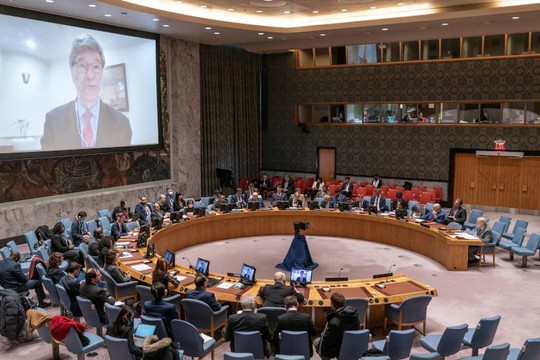Jeffrey Sachs, the economist and professor at, delivered remarks to the United Nations Security Council about the destruction of the Nord Stream pipeline (photo).
Sachs, who was invited to speak by Russia — but who told “The New Yorker” that it was “important to note” that he was there on his own behalf — called for an investigation of the incident. He has previously suggested that the United States was responsible; so far, no evidence linking the U.S., Russia, or any other nation to the attack has emerged.
It’s an interesting chapter for a man who was best known, for many years, as a member of the American establishment. (Thirty years ago, the Times called him “probably the most important economist in the world,” for his role in pushing post-Soviet Russia to adopt “shock therapy.”) Since then, Sachs has advised multiple U.N. Secretaries-General and written multiple books.
Here are some points from this interview for “The New Yorker”:
- This is a war in Ukraine reflects rising tensions between the United States and Russia now for a quarter century.
- The key to this, which is now well discussed, but still not well understood, is the post-1991 vision of strategic leaders in the United States: that we are now in a unipolar world, and that the United States can do pretty much whatever it wants, and that includes basing the military where it wants and when it wants, entering and exiting treaties when it wants and where it wants, without serious consequence. In the mid-nineties, there was a quite ferocious debate over even the first phase of NATO enlargement, where many wise people, including Bill Perry, our Defense Secretary at the time under Clinton, thought that this was a dreadful mistake; many others did, too. And George Kennan, whom I regard as the essence of wisdom, thought that it would lead to a new Cold War.
- The war began, however, nine years ago, with the U.S. participation in the overthrow of Ukraine’s President Viktor Yanukovych, in February, 2014 — the very active U.S. role in that. We’ll only perhaps know the full extent of it when the archives are opened, decades from now. We know enough that this was why the war actually occurred.
- I’m a little confused when you talk about 2008, because the full-scale invasion of Ukraine didn’t start until 2022, fourteen years later, and Ukraine was no closer to getting into NATO.
- Ukraine was already in a battle in which the United States was heavily participating, between a divided country, east and west divisions, pro- and anti-NATO divisions, and so forth. In 2005, Viktor Yushchenko became President; he [later] called for Ukraine to join NATO. This created the big tensions that led to 2008. And then Yushchenko was defeated and Yanukovych came in saying ‘we should have neutrality’. And that, I believe, was viewed as an affront to the U.S. policymakers who were intent on NATO enlargement.
- In late 2013, when protests against Yanukovych broke out, the U.S. took the occasion to play extremely actively in this and in ways that were rather direct, let us say — paying a lot of money to those who were leading this so-called movement and helping to finance what became a coup. It was a coup, of course. It was an unconstitutional seizure of power when very violent groups, well armed, stormed the government buildings in February, 2014.
- When it comes to Ukraine, what is so horrifying for me is that this war, even considering the multiple facts I’ve laid out that were the predicate to this war, could have been avoided at the end of 2021. President Putin put on the table three demands: no NATO enlargement, Crimea remaining part of Russia, and the Minsk II agreements being implemented. The United States refused.
- Let me put it this way. First, stopping NATO enlargement is not a concession. It’s both a necessity and a matter of prudence for the United States. It was a terrible idea, period, for the U.S.
- I can understand why they would want to be part of NATO, but I cannot understand why the United States would think it’s safe and prudent to push NATO into Ukraine, into Georgia. It’s completely reckless. The questions of Crimea and the Donbas arose after the U.S. participation in the coup against Yanukovych, because before that Russia wasn’t taking Crimea.
- What Yanukovych was negotiating with Russia was a long-term lease so that the Russian naval base would be in Sevastopol, and it would be there until at least 2042, with options for renewal. In the Donbas, there was an ongoing twenty-year heavy debate about autonomy and about languages, but there was nothing like war.
- China, India, Brazil, South Africa, Indonesia, and a number of other major countries that are not party to this war and have normal relations with Ukraine, with Russia, and with other countries are saying that there should be an end to this war through negotiation. This is important, in my view. These countries constitute a significant part of humanity and a significant part of the global scene.
- What China has said all along, that the security interests of all parties should be respected, in my view, is a basis for saying that Ukraine’s sovereignty and security need to be protected.
- And, at the same time, NATO should not enlarge, because that threatens the security of Russia. That, to my mind, is understanding properly the structural challenge that we face in reaching peace.
read more in our Telegram-channel https://t.me/The_International_Affairs

 12:02 07.03.2023 •
12:02 07.03.2023 •























